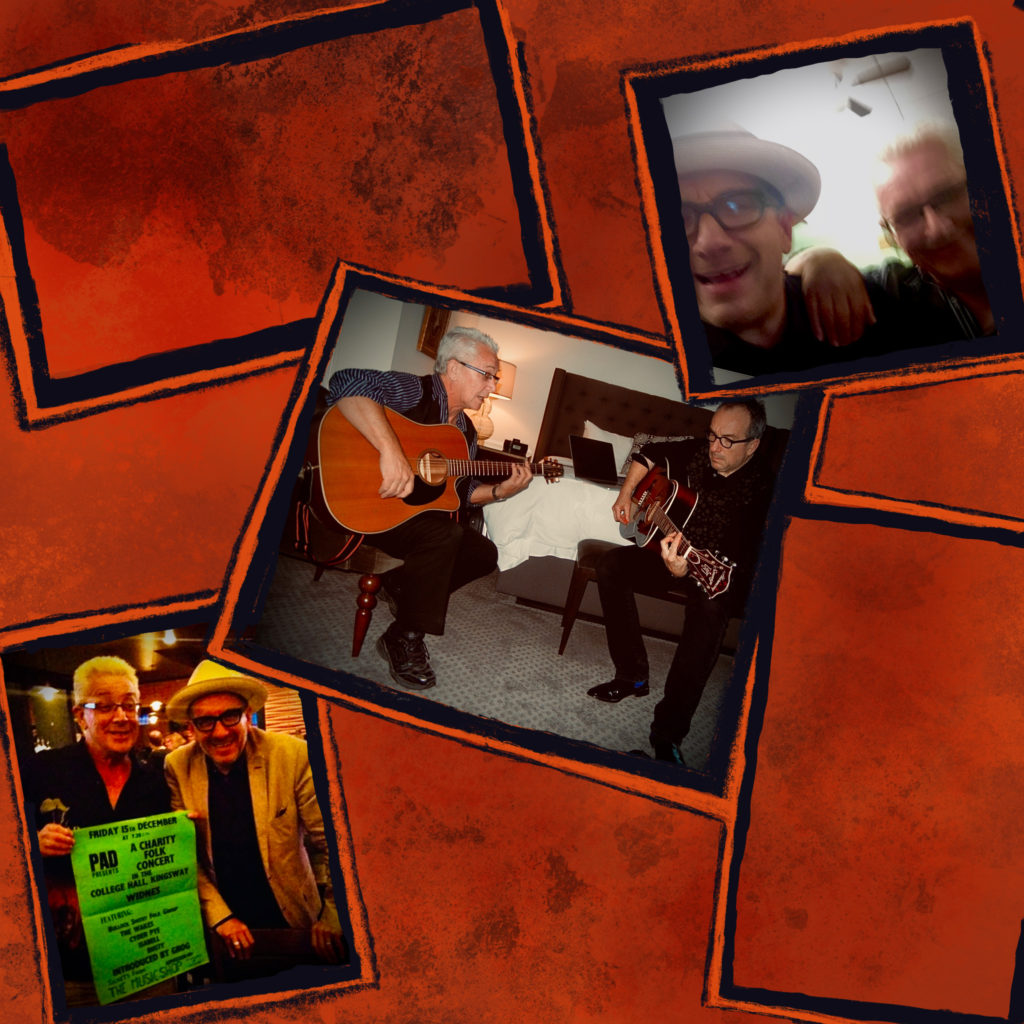
06.30.2022
Summer Of 1972 – The Dynamic Trio Become The Dynamic Duo
We played a lot of gigs during that summer, not because we were so good or popular, but because we were prepared to play for free.
At the time in the U.K. on the folk club circuit, they had something called ‘floor singers night’. Nowadays that would be referred to as an ‘open mic night’.
Basically any fool with a guitar could be invited up on stage and play their songs, supporting a ‘major’ folk singer.
I have a hilarious memory of a kid who couldn’t play any instrument but had some songs he’d written. He would do all the instrument fills with his mouth between the vocal lines [Ching! Ching! Wah! Wah Wah! Drrr! Drrr! Crash, Crash, Crash,]. Mental.
In our attempt to be accepted by the folk club circuit we made a pathetic attempt to add some mainstream cover versions of chorus songs. Basically this merely involved playing some of the lighter material of our favorite writers. [“The Mighty Quinn”, “Old Kentucky Home”, “Fog On The Tyne”, etc.] The hardcore folk clubs were not impressed and would mock any song that didn’t have lyrics about ship wrecks or potato famine.
Our comfort zone was most definitely the poetry circuit [Yes, there was such a thing in the early 70’s in Liverpool] Don’t forget, this was Liverpool and just a few years after the Mersey Poets like Adrian Henri, McGough, Brian Pattern, etc. had taken the hippy world by storm.
Bass player, Alan Brown left late in that summer to pursue a University career, Declan finished his ‘O’ Levels and I was working for Liverpool City Council in the famous Liver Building.
Now, we were a streamlined duo with the world at our feet.
Brinsley Schwarz / Nick Lowe / Clover / Help Yourself
In a junk shop in Liverpool I’d picked up a copy of the first Brinsley Schwarz album. I loved it and presented it to Dec at our next rehearsal. He dismissed it as a poor man’s Crosby Stills and Nash.
He was always more of a fan of the darker writers like Jesse Winchester or Randy Newman or the meandering instrumental breaks of the Grateful Dead.
By the time I turned up with the second Brinsley’s album, pub rock was the order of the day and Nick Lowe’s songs were tailor made for us. “Country Girl” from Despite It All would be our opening song at dozens of gigs over the next year or so. When Silver Pistol was released the following year, we played everything but the sleeve.
This is pretty much where the phrase ‘the rest is history’ should emerge.
The Nick Lowe connection would set up the legendary icon that was to become Elvis Costello. The Brinsley Schwarz Cavern Club appearance in Liverpool is well documented in the Costello autobiography so it’s safe to move on.
At the other numerous Brinsley’s gigs we went to during that period they would play a song by a band called Clover. The band had also been name-checked in one of the songs on Silver Pistol. As luck would have it, I’d stumbled upon some early Clover albums and included was the song “Love Is Gone”, the song that the Brinsley’s had covered. We had no shame in covering the cover of a cover and although I have no record of us playing it. I’m almost certain we would have had a go at it.
Like Nick Lowe, Clover would play a big part in the events of the future.
In the summer of ’72 we were offered a Tuesday night residency at a club called the Temple Bar on Dale Street in downtown Liverpool. We would play every Tuesday and book all the acts and share the door take with them. This amount would vary weekly between zero and six pounds.
It was a pretty uneventful period with one exception.
Maureen And Sam / Dan / Stan
On September 5th 1972 we debuted a new song called “The Show Must Go On”.
I still have the original hand written lyrics with crossings out and changes in certain words.
It was pretty much a Macmanus 3/4 time story song about a couple of wannabe vaudeville singers.
Shortly thereafter, he changed the title to ‘MUST The Show Go On’.
On November 30th of that year, I have it listed and performed by Rusty under the title, Maureen and Dan.
Some years later I would re-title it “Maureen and Sam” and write eight more songs about the same couple in a sort of mini rock opera which my 1974-1977 band would perform regularly.
He in turn re-named the couple “Maureen and Stan” and name-checked them in the song “Ghost Train” on one of the early Elvis Costello albums.
In my version Maureen would die in obscurity at the end of the song.
Sam however would live forever and continue to change his name more often than some of us change our underwear.